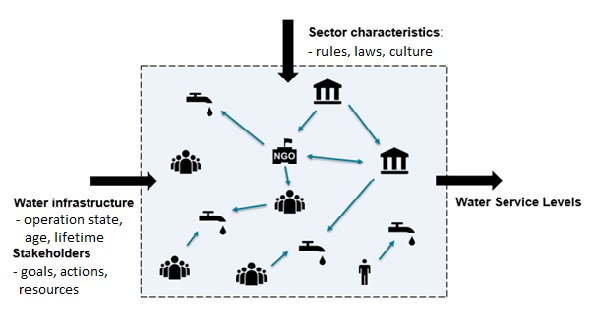How can I conceptualise and model learning in the rural water supply system in Uganda?
Published on: 22/03/2016
This is the challenge I'll be working on for the next 5 months at IRC. I'm a student at Delft University of Technology, following the master Systems Engineering, Policy Analysis and Management. At my faculty, we learn to look at the intersections between technical systems and social systems and design for complex systems.
Imagine a red car. Is this car complex or complicated? In common language these words are often used interchangeably, but in the field of Complex Adaptive Systems (CAS) they represent different things. A red car is a complicated thing. It consists of thousands and thousands of little parts that are all in some way connected to each other in order for the car to move. Complicated.
Now imagine a person in the same red car in between hundreds of other cars. Complex or complicated? Right, complex. The person in the car has a destination, the person can be in a hurry, can be sad, tired, exhausted. The car next to it is similar: a person with a destination, a mood and a route. All cars in traffic make decisions and the result of all these individual decisions and their interactions determine the outcome of the system: a flow of cars, a traffic jam, or even an accident.
Emergence is in my view the most interesting part of a CAS. Emergence is the phenomenon of interesting, non-obvious consequences of the interactions between things, in this case red cars, that make decisions. Take the traffic pattern occurring when cars decide to hit the brakes. Nothing special has to happen if one car decides to break. However, when there are many cars on the road that react on the action of that car then, minutes later, a traffic jam might emerge. The traffic jam, however, is not the result of the first car hitting the brakes. It is also caused by the next car hitting the brakes, and the next one, and every other interaction between all those cars on the road.
Observing the emergent properties of a system, means observing the system as a whole. This is different to the more traditional perspective on systems thinking, where systems are decomposed and each part is analysed in order to understand the working of a system. This would work very well in complicated systems. CAS theory tells us that you might lose very determining properties of a system when you decompose it. Back to the traffic example: decomposing the system to individual cars for instance, makes it difficult to discover the cause of the traffic jam: cars that break in reaction to other cars breaking.
A translation of the perspective to water, sanitation and hygiene (WASH) is an easy step to take. There are many complicated, technical parts, e.g. the water infrastructure. They are placed within an environment with many different people and organisations that make decisions about the water infrastructure. The interactions between the parties that make decisions that affect the technical parts as well as other people and organisations determine the outcome of the system. The decisions and their effect are bounded by the structure of the system, for example by rules, laws, and culture. In the traffic example the same is applicable: traffic rules, infrastructure and norms on the road impact the systems outcome. It is even more complex when different parties have different goals or different views on how to reach a goal – unmistakably the WASH sector.

Now this perspective is not completely new to the WASH sector – quite the opposite is true, take for instance the alignment of donor efforts or research into delivering whole systems change. How the CAS perspective turns out to be any good for learning in the rural water supply system in Uganda I'll write about in my next blog.
At IRC we have strong opinions and we value honest and frank discussion, so you won't be surprised to hear that not all the opinions on this site represent our official policy.